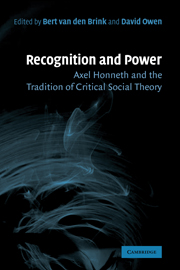Book contents
1 - Introduction
Published online by Cambridge University Press: 24 July 2009
Summary
The topic of recognition now occupies a central place in contemporary debates in social and political theory. Rooted in Hegel's early Jena Writings and the famous discussion of the Master/Slave dialectic in his Phenomenology of Spirit, and developed in a variety of ways by George Herbert Mead, Frantz Fanon, Jean-Paul Sartre, Charles Taylor and Nancy Fraser, recognition has been given renewed expression in the ambitious third-generation program for Critical Theory developed by Axel Honneth over the past twenty years, most prominently in his classic text The Struggle for Recognition.
Honneth's guiding thought has two aspects. First, modern ethical agency requires the formation of practical relations to self that are constituted in and through relations of recognition across three axes of self-formation: love, respect, and esteem. Second, the non-recognition or misrecognition of ethical subjects along any of these axes of self-formation is experienced as a harm or injustice that, under favourable social conditions, will motivate a struggle for recognition.
The research program that Honneth has developed is widely acknowledged as both an empirically insightful way of reflecting on emancipatory struggles for greater justice within such societies and a powerful way of generating a conception of justice and the good that permits the normative evaluation of such struggles. The aim of this volume is to offer a critical clarification and evaluation of this research program and particularly its relationship to the other major development in critical social and political theory over recent years – the focus on power as constitutive of practical identities (or forms of subjectivity) proposed by Michel Foucault and developed in a variety of ways by theorists such as Judith Butler, James Tully, and Iris Marion Young.
Information
- Type
- Chapter
- Information
- Recognition and PowerAxel Honneth and the Tradition of Critical Social Theory, pp. 1 - 30Publisher: Cambridge University PressPrint publication year: 2007
Accessibility standard: Unknown
Why this information is here
This section outlines the accessibility features of this content - including support for screen readers, full keyboard navigation and high-contrast display options. This may not be relevant for you.Accessibility Information
- 12
- Cited by
